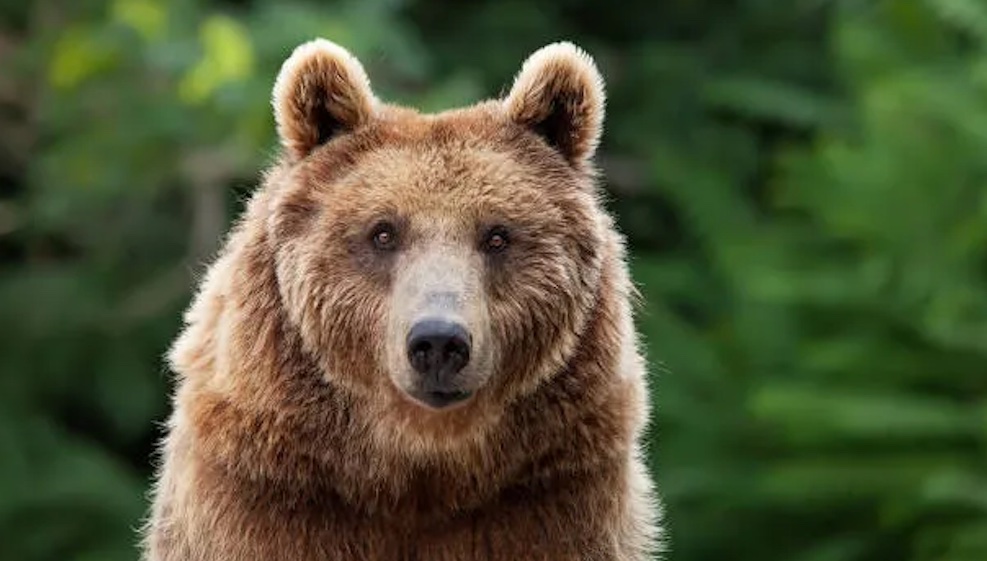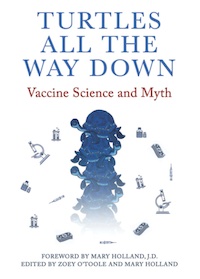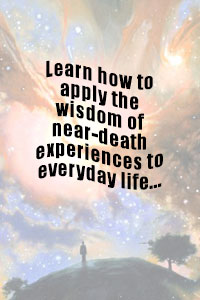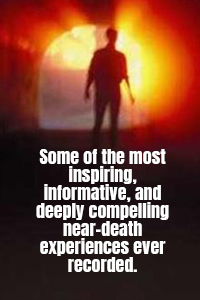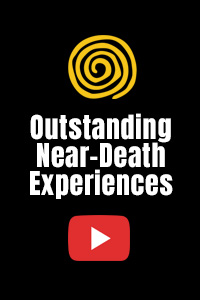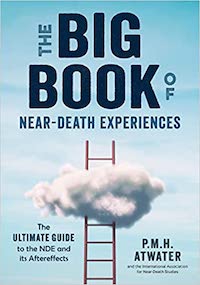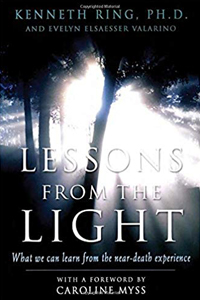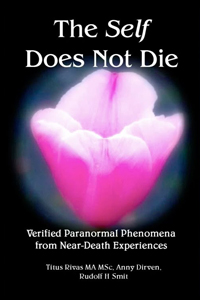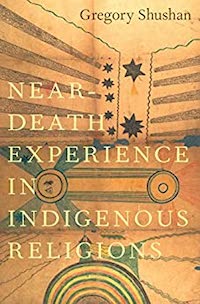Excerpted from:
The Way of the Hermit: My Incredible 40 Years Living in the Wilderness
By Ken Smith
From the “Grim And Grizzly” chapter
It usually doesn’t take anyone long to nudge the conversation towards an imagined scenario where — roaming the wilderness of North America — I might have been ripped apart by a grizzly bear, wolf, mountain lion or, at the very least, trampled by a giant moose.
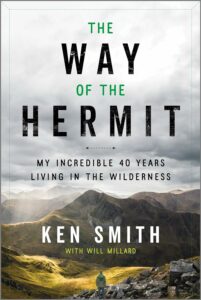 Regular people have a strange preoccupation with the idea that death in the wilderness is likely to come from the tooth or claw of some bloodthirsty, rampaging predator. The truth, though, is always much more benign. Truly wild encounters with the creatures most capable of ending our lives are usually fleeting snapshots: a flash of fur here, a heavy, crumbling rush through the brush there, as whatever-it-was crashes from the scene the very instant it becomes aware of your presence.
Regular people have a strange preoccupation with the idea that death in the wilderness is likely to come from the tooth or claw of some bloodthirsty, rampaging predator. The truth, though, is always much more benign. Truly wild encounters with the creatures most capable of ending our lives are usually fleeting snapshots: a flash of fur here, a heavy, crumbling rush through the brush there, as whatever-it-was crashes from the scene the very instant it becomes aware of your presence.
Predators are pragmatists. They are lethally armed to quickly dispatch far weaker prey in an instant, but they will predominantly target the lamest, sickest, smallest, slowest and stupidest. In that way they maintain and sustain the health and balance of an environment or herd; and you can be sure that when an ecosystem is beset with myriad problems, the apex predators — those at the top of the food chain, without predators of their own — will almost certainly be missing from the scene.
Luckily for us, their highly selective hunting strategy writes a hefty chunk of life insurance into your policy whilst out wandering in their territory. To them, we offer up a pause for thought. Superficially we look lame, sick, small, slow and stupid, but we are not their regular prey and could well be hiding a weapon. If a predator can’t be absolutely sure you offer no conceivable threat to them, then they’ll nearly always steer well clear, and target something else instead.
Statistically speaking, in modern times, the chances of dying while out on some backcountry adventure are extraordinarily low. In the United States, if you exclude the tragedy of suicide, the likelihood of you dying in a National Park hovers somewhere around one in two million; ten thousand times less likely than you losing your life in a car accident in the same country. Bears are by far and away the most dangerous of all the mammalian predators, but even then, they account for less than 1 percent of total deaths in the wilderness. We are talking about, on average, just eleven deaths in North America every year, and, although bear attacks never cease to shock with their brutality, the chances of you being attacked are still incredibly remote.
In terms of animals, you are far more likely to be killed by bees than bears, and over half of the deaths in the wilderness are caused through either falling, being trapped in an avalanche, drowning, or simply getting lost and then subsequently dying from heatstroke, hypothermia, starvation or dehydration. All are truly appalling ways to meet your maker, but none quite have the same star-power Hollywood draw as a good old-fashioned bear attack. They feel somehow pedestrian by comparison, and yet that is precisely what makes them so dangerous. While you’re out buying your bear spray and bells, you neglect to do the really simple things like check the weather forecast, get a good coat, or bring adequate food or shelter.
In fairness, though, falling from a slope or getting a bit cold and thirsty are all things you’re highly likely to experience at some point or other while you’re out on a big trek. They are usually very trivial, very survivable events that happen with a certain degree of frequency when you’re walking for weeks on end; whereas being attacked by an 800-pound grizzly bear…well, that only needs to happen once.
I had maybe twenty encounters with bears during my travels. Most were passing affairs: a bear peering from behind a rock before scuttling off, another vaguely plodding around the camp, or a mother and her cubs spotted roadside as I hitched a ride; but a few really did get the pulse racing.
In the Rockies a black bear sniffed my rucksack for food, and in Alaska it took a lot of shouting and gun-toting to get one shifted from our camp. Once, while fishing, I turned a bend in the river and met a black bear head-on. Fortunately, it shot up a big cottonwood tree and we both made our escapes.
The worst moments were when the bears were unafraid. Four occasions really stick in my mind. Once I walked within twenty feet of a black bear, which simply roared back at me, and sent me hurrying off. One nighttime camp invader was so persistent, I had to set fires all around the tarp to try and ward the bear off. And the one with Roy was pretty extraordinary. Despite all our attempts to scare that bear away, it still opened Roy’s pack and took half our provisions in a single mouthful. That was a big grizzly, and was almost within touching distance of where we lay. As soon as it disappeared off with its hoard, we were up. Lighting fires and sitting up till dawn, absolutely quaking in our boots.
The best single piece of advice I can give if you are ever in a threatening position with any potentially violent wild animal is, whatever you might be feeling inside, you must fight the urge to run away. Running shows weakness and fear, two emotions that are near certain to escalate the predator’s idea that you are a very easy meal indeed. They could, in fact, lethally execute you long before you could ever make it to a climbable tree. You could never outrun a bear, a wolf, or a mountain lion; and, even if you did manage to get to a tree, a bear or a mountain lion would come straight up after you and peel you open like a can of beans.
What you need to do is play to that pragmatic part of the predator’s mind, which I mentioned earlier. You are looking to convince it that, however soft and fleshy-looking you may appear, you are still not worth the risk; that you could fight back; that you might somehow have the ability to maim and wound.
Stand your ground, slowly back away, if you can, and the mountain lion or wolf will very likely back down too. The only exceptions could be the bears. You are definitely giving yourself the best possible chance of survival if you don’t show fear, but bears — especially the grizzlies — are much more aggressive.
If you stand still but the bear still attacks and is black, then give it absolutely everything you have: shout, scream, target the eyes and ears, punch, kick, and use any available weapons like sticks and stones. If it is the much larger brown or grizzly bear, though, for god’s sake: just play dead. Don’t get me wrong: a black bear is no teddy, and anyone trying to fight one off is still in almost the deepest trouble imaginable, it’s just that, in this truly dire game of mammalian Top Trumps, the person with slightly worse luck is definitely the one stuck beneath the grizzly.
To give you a very brief natural history lesson: generally speaking, your brown bears are in the coastal areas of Alaska, whereas your grizzlies (which are also a type of brown) are found inland and have no access to marine foods. Either way, they are up to double the weight of a black bear and twenty times more likely to cause injury. They are armed with huge teeth and curved claws that can extend up to four inches in length; twice the size of the black bears’.
A grizzly “attack” is most likely to be a pure defensive reaction to that bear having bear cubs somewhere in the area. In which case, a fight back is not only pointless, but it is far more likely to confirm to the bear that you are indeed a threat to their children’s safety and need to be neutralized for the sake of their progeny. Quite often, the grizzly will come bowling over, knocking you, “the threat,” to the ground to firmly establish your weakness (and their dominance) before they then simply move on with their cubs.
According to the established wisdom, only when it becomes obvious that the grizzly attack really isn’t a test should you fight back; but I think it is fair to say that finding someone with that level of composure, in the heat of any bear assault, is about as slim as their odds of survival.
If you have been unlucky enough to be attacked by a grizzly and have somehow survived, then I hope you can count yourself fortunate to have at least escaped with your life; but I’m sure things are never quite the same after an ordeal like that.
As humans have greedily extended our own territories out into the homes of these animals, degrading the environment and removing the naturally available food sources of many predators, we have caused an upswing in the amount of contact we wind up having with these potentially dangerous animals. The scarcity of their natural food is forcing many predators to look elsewhere, and when a phenomenal sense of smell, a degree of intelligence and increasing desperation all meet in the middle, it doesn’t take too long before you start seeing an apex hunter in some very unexpected places indeed.
Which all leads me neatly on to my very best near-death bear story.
It happened while I was stopping at Whitehorse, the capital of the Yukon, and I was indulging in one of my favorite money-spinning escapades. I was down at the local rubbish dump looking for useful things that people have thrown out. Anything that could help me in any way. You would not believe what gets thrown away down there. Humans are incredibly wasteful, but, as the old northern saying goes, “Where there’s muck, there’s brass.”
Over many years of dump-diving, I’ve found clothing (including brand-new boots), in-date cans of food, pots and pans, full batteries, and loads of electronics; I’ve even found money. Industrious people with flatbed trucks would be backing in and out of those places all the time, lifting kitchen appliances, old motors, wiring, whole carpets, and then making simple repairs, or giving them a clean before selling them, almost good as new.
This particular dump was enormous. A large twelve-foot-high fence spanned the perimeter, while bulldozers and diggers moved around inside, inside, managing mountains of rubbish that were so high they towered over you and frequently blocked out the sunlight.
The trick for a good haul was to head for areas that had been freshly dug or piled by the diggers: either the mountains of newly turned treasures, or the craters left behind in the waste. That fateful day I was deep in the dump, walking up a hill of rubbish to get to an area where a new pile had just been created. I was strolling along a plateau, and couldn’t have been too far from my destination, when a movement to the left of my makeshift path stopped me dead in my tracks.
My heart rate danced as my focus was pulled towards the source of the movement. I could see immense bulk, and brown fur moving backwards. This was not a trick of the light, a cuddly toy, or a hallucination brought on from the stench of the dump. What I was looking at was the giant arse of a simply enormous grizzly bear as it reversed its way backwards out of the hole it had just created in the garbage.
Clearly, it had been looking for food and, judging by the look on its face, it had been unsuccessful. I stood motionless, not due to my superior knowledge of staving off death by bear, but because I was quite simply stupefied by terror.
We were face-to-face on the same pathway, and now the grizzly was slowly, but very purposefully, advancing towards me. Clearly, I was in very deep trouble indeed. I was hemmed in by the dump’s fence on all sides and, at twelve feet high, as much as it might seem theoretically possible for me to scale the barrier without being eaten, I could only make it there if I could first negotiate my way around the labyrinth formed by all the dump’s rubbish.
If the bear didn’t catch me before I got to the fence, which seemed highly likely, it would almost certainly catch me as I tried to scramble over. This fully grown grizzly stretched some eight feet in height from its feet to its claw-tips. It would pluck me off and crunch me as easily as I’d pinch an apple from a tree.
It left me with just one credible option for escape. I needed to go right back the way I’d come. Back along the plateau atop the rubbish mountain, then down the pathway till I made it to the sole entrance and exit: the main gate in the fence. It seemed an almightily long way away right then, but, through the fog of catatonic fear I knew, no matter what I did, I could not make a run for it.
The bear might have been moving on me with serious intent, but it wasn’t charging me. Not yet, anyway. Given a grizzly can sprint at up to thirty-five miles per hour when it wants to, the best chance I had was if the bear maintained its measured plod. This was obviously no grizzly defending her cubs. This was the far rarer example of a grizzly actively engaged in stalking a human. If it made it to me, which it absolutely was going to if I remained still, “playing dead” would quickly result in performance art becoming dreadful reality.
In terms of human-bear interactions, this was the most dangerous position you could possibly be in, with the absolute worst brand of bear: a giant adult grizzly that held no fear of humans and was very hungry.
With the gap closing between me and the bear, I slowly started to pace backwards. Remaining calm in my body language, making no rapid movements, and giving no reason for the bear to bolt forward, while very deliberately moving away and keeping my eyes fixed upon the animal. Luckily, as I began to move, the bear’s pace did not quicken, and we entered a curious dance where we maintained a distance between us by matching pace: me backwards, the bear forwards. I just had to hope I didn’t trip over on some lump of trash, otherwise I was definitely history.
It is a curious experience, being confronted with your total physical vulnerability. Our lifestyle, our technology, our houses and cars all shield us from our actual, feeble reality. They create a reassuring gap between now and the time in the past when we all lived in caves and trees. Back in prehistory, the specter of a very violent death at the hands of a saber-tooth, cave hyena, or short-faced bear was omnipresent; but today, most humans, and especially those who live in the Western world, can easily go their entire lives without ever realizing quite how fragile and feeble we really are, especially when held up against the apex predators of the wider natural world.
It was highly ironic that, trapped within this colossal mountain of human engineering, the visual metaphor for all our “progress,” there was not one single thing at hand that could’ve staved off the murderous advances of this bear. Most of the waste I walked within had been created purely for our living convenience, improving our lives on the one hand, whilst degrading the planet’s habitats and condemning this bear to hunt the dump for food on the other. I was in a truly pitiful position. A highly intelligent tortoise who had forgotten to put on his shell.
Walking backwards, I made it across the plateau and became aware that I was heading back down the slope. That was my eureka moment. If I maintained the gap now, there would soon be a very brief moment where the bear would disappear from view over the brow of the hill; the only time in my retreat where I wouldn’t be able to see the bear and, crucially, it wouldn’t be able to see me either.
I stared back at the bear as I paced down. “Can’t see its ankles now,” I muttered to myself. “Can’t see its legs now,” I continued. “Can’t see its belly…can’t see its head.”
And in that moment, I broke the golden rule of grizzly attack and ran as fast as I ever have in my entire life. In Derbyshire parlance, I ran like absolute buggery—straight back through the gate and down onto the road outside the dump. There, I met a V-shaped junction cutting around a small wood but, filled with adrenaline and panic, and certain the bear’s breath was hot on my heels, I didn’t even deviate from my course. Instead, I ran straight through the wood, straight out the other side, and almost got flattened by a truck.
The man slammed on his brakes and exploded at me in a rage of brake pad fumes and dust. “There’s a grizzly inside!” I screamed back at him. “GRIZZLY BEAR!” he shouted back, his countenance doing an instant about-turn as he quickly reached down the back of his seat for his gun.
This man was armed and ready in a way that suggested he might’ve been waiting for this moment his entire life. With one hand on the steering wheel, and another on the trigger of a rifle that looked capable of dispatching a T. rex, he blasted his truck all the way to the front gate and ran inside.
I was safely back in the human world of faux superiority through working technology, but I didn’t hear a rifle shot and the bear had already escaped. I’d been very lucky and so had the bear. The municipal rubbish dump was no place to die for either of us…

